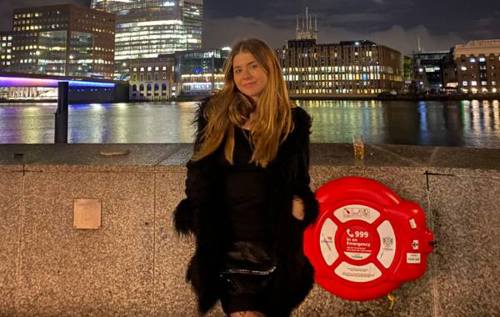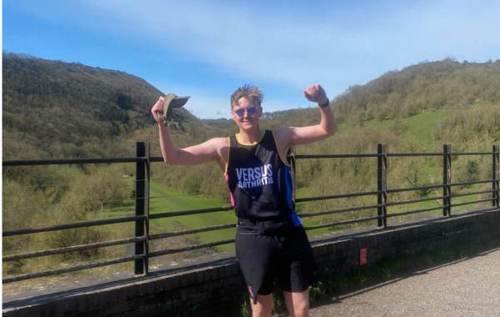“I’m really looking forward to going to university”: Daisy has JIA and is hopeful about the future
04 September 2023
Daisy was diagnosed with juvenile idiopathic arthritis (JIA) at age three.
JIA starts before age 16 years, and happens when the immune system, which is the body’s natural self-defence system, attacks the body. This causes many symptoms including painful, stiff and swollen joints.
Daisy is now getting ready to go to university. She tells us about growing up with arthritis, and of her hopes for the future.
Daisy’s diagnosis
“When I was three, I was struggling to walk. I was crawling and my parents realised something was wrong. I was going to swimming lessons and one of the mums there thought I needed to get my knee checked out. I went to the hospital and I was diagnosed with JIA.
The pain was originally in my knee, and I still feel those symptoms. But the medicines I’m on make my immune system weakened, so I need loads of vaccinations to prevent against illness.
Around December 2021 I went in to have one to protect me from pneumonia and something happened – the doctor thought the area of the needle hadn’t been cleaned properly – so bacteria got into where the injection site was. This resulted in me getting cellulitis [an infection of the deep layers of the skin] and I was in hospital for about a week.
When the cellulitis eventually went away, I started feeling symptoms in other parts of my body like my hips and my jaw. So originally the arthritis was in my knee, but now I feel it in multiple areas of my body.”
Growing up with arthritis
 “Getting diagnosed with JIA was quite an alien thing I think, especially for my family. I remember not being able to participate in the sports and activities that my peers were at that age, especially with going to nursery. My parents and older brother remember it as being quite worrying as they didn’t know much about arthritis then.
“Getting diagnosed with JIA was quite an alien thing I think, especially for my family. I remember not being able to participate in the sports and activities that my peers were at that age, especially with going to nursery. My parents and older brother remember it as being quite worrying as they didn’t know much about arthritis then.
All my friends have always been so supportive. Teachers and school nurses have always done the most to make sure I’m comfortable. [JIA] has made me stronger, it’s made me more resilient and determined to do the same activities that all my friends are doing.
When I tell people I have arthritis, they’re like, ‘isn’t that what you get when you’re old?’ I have to explain it’s not osteoarthritis [a condition where joints cannot maintain and repair joints, which is more common as we get older] it’s different, and then they understand. I don’t mind explaining, but I do think there’s a lack of awareness of arthritis in younger people.”
Sitting exams with arthritis
“One of the places I have arthritis now is in my fingers. Sitting my A-Levels hasn’t been ideal because I’ve had some really long exams. The hospital has been great and they let the school know I needed to have rest breaks and extra time.
Still, I had a history of art exam that was three hours and with extra time took it up to four and a half hours. It was so painful writing quickly.
For exams, rest breaks are so helpful instead of being sat down in one position.”
Support from family
 “My brother Arthur ran the London Marathon for Versus Arthritis this year. Seeing him run it was so crazy to me. I couldn’t get my head around the fact that someone would go through all of that for a cause that deeply affects me.
“My brother Arthur ran the London Marathon for Versus Arthritis this year. Seeing him run it was so crazy to me. I couldn’t get my head around the fact that someone would go through all of that for a cause that deeply affects me.
My mum and I went to support him and saw him at London Bridge. He was in really good spirits. I think he was feeling a bit painful towards the end, but he finished in about five hours which he was really pleased with.
It was really surreal and emotional. It made me so proud of him.”
Daisy’s tips for managing pain
“It’s difficult to describe my arthritis pain. It’s a mixture between a sharp and an achy pain. I’ll get it if I don’t move my legs around a lot, or if it’s cold outside. If I over exercise or under exercise that’s when the pain flares up a bit.
If I’m feeling a pain coming on, often what helps me is:
- Taking two paracetamols. That can act as a really good preventative method.
- Stretches from the physio. I’ll get up and exercise if I’ve been sat in one position all day.
- A hot or cold compress.”
Daisy’s hopes for the future
“It’s nice to hope in the future that there could be a cure. I’m hopeful, but I have to manage my expectations and be realistic.
I’d like to see research continue and hopefully there can be more understanding around what causes JIA, or better treatment to manage the lifestyle of someone who has JIA.
I’m really looking forward to going to university. In terms of the pain, it’s not affecting my life now and I don’t think my routine will change too much. It’s all positive.”
Our young people and families service
If you or a family member under the age of 25 has arthritis, we run a Young People and Families service that provides information and support and puts on a range of events across the country.
Our service helps young people and children offers advice on how to live well with arthritis, medication and potential treatments, as well as creating a safe space to ask questions, receive information and develop support networks.